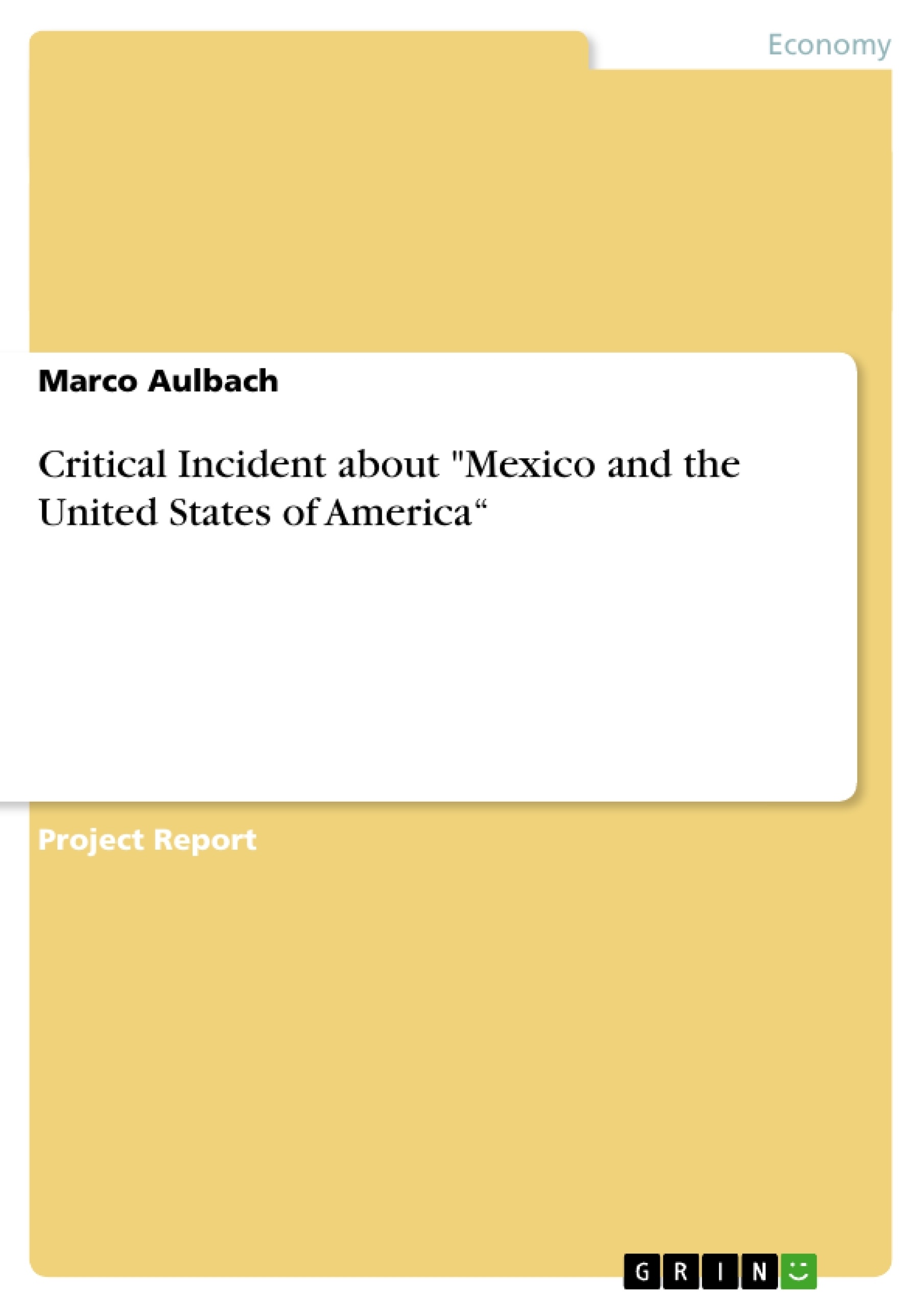A busy German production manager of an automotive company, Peter Müller (30), is
sent to a short trip to manage a new supplier manufacturing facility in Mexico. The
questioned Mexican supplier manufactures high-tech safety systems similar to
another American supplier.
On his arrival, the Mexican production manager, Juan Lopez (47), suggests to go to
the factory to meet the workers who have been awaiting his arrival. Joe declines
Juan´s offer and chooses instead to get right to work on determining why the quality
and production rate of the Mexican supplier plant are not equal to the U.S. supplier
plant. Juan stresses the importance of getting to know the workers first, but Joe lets
Juan know he was sent to Mexico to straighten things out, not to form friendship with
the local workers.
Without further comment and a grim face, Juan gets Peter the figures and records his
requests. Peter makes a number of changes and feels sure the plan he has prepared
will improve quality and increase production. Then, he flies back to America again.
After a couple of months, no improvement has been made; Peter cannot understand
why the workers seem to resist his plans. [...]
Inhaltsverzeichnis (Table of Contents)
- Critical Incident
- Summary of the Critical Incident
- Cultural Analysis
- American Culture
- Mexican Culture
- Low- and High- Context Communication
- Low-Context Communication
- High-Context Communication
- Deal- and Relationship-Focused Cultures
- Deal Focused Cultures
- Relationship Focused Cultures
- Solutions
Zielsetzung und Themenschwerpunkte (Objectives and Key Themes)
This case study explores a cross-cultural incident between a German production manager from an automotive company and his Mexican counterpart. It analyzes the cultural differences that led to misunderstandings and failed communication between the two individuals. The key themes explored are:- Cultural differences in communication styles, specifically low- and high-context communication.
- The importance of building relationships in Mexican culture, contrasted with the American focus on immediate results.
- The influence of historical and social context on cultural values and behaviors.
- The potential for misunderstandings and conflicts arising from cultural differences in the workplace.
- The need for cultural awareness and sensitivity in cross-cultural business interactions.
Zusammenfassung der Kapitel (Chapter Summaries)
- Critical Incident: This chapter introduces the scenario of a German production manager, Peter Müller, sent to a Mexican supplier factory to improve production and quality. He immediately clashes with the Mexican production manager, Juan Lopez, over the importance of building relationships with workers before focusing on production.
- Summary of the Critical Incident: This section provides a concise overview of the conflict between Peter and Juan. It highlights Peter's focus on efficiency and immediate results, while Juan emphasizes the importance of cultural sensitivity and relationship-building in the Mexican context.
- American Culture: This chapter delves into American cultural values and their impact on communication and work practices. The chapter highlights the American focus on efficiency, directness, and individualism, linking these characteristics to the historical experience of European immigrants in North America.
- Mexican Culture: This chapter examines Mexican culture and its emphasis on collectivism, relationship-building, and a more indirect communication style. It explains the importance of social harmony and the value of personal connections in Mexican business practices.
- Low- and High- Context Communication: This chapter introduces anthropologist Edward T. Hall's theory of high- and low-context communication. It explains the differences in communication styles between cultures, highlighting the American preference for explicit and direct communication and the Mexican emphasis on implicit and contextual communication.
Schlüsselwörter (Keywords)
This case study focuses on the core concepts of intercultural communication, cultural differences, high- and low-context communication, relationship-focused cultures, and cross-cultural business interactions. It examines the challenges of managing cultural diversity in the workplace and emphasizes the importance of understanding and navigating cultural nuances for successful international business practices.Frequently Asked Questions
What is the "Critical Incident" described in this case study?
It describes a conflict between a German production manager, Peter Müller, and a Mexican manager, Juan Lopez, regarding workplace priorities and relationship building.
What is the main difference between low-context and high-context communication?
Low-context communication (e.g., USA/Germany) is direct and explicit, while high-context communication (e.g., Mexico) relies on implicit cues and the surrounding context.
Why did the German manager fail to improve production in Mexico?
He focused solely on technical figures and efficiency, ignoring the Mexican cultural necessity of building personal relationships with the workers first.
How does Mexican business culture differ from American/German culture?
Mexican culture is relationship-focused and collectivist, whereas American and German cultures tend to be deal-focused, individualistic, and direct.
What can be learned from this intercultural conflict?
Successful international business requires cultural awareness and the ability to adapt management styles to local values and communication preferences.
- Quote paper
- Marco Aulbach (Author), 2012, Critical Incident about "Mexico and the United States of America“, Munich, GRIN Verlag, https://www.grin.com/document/211323



